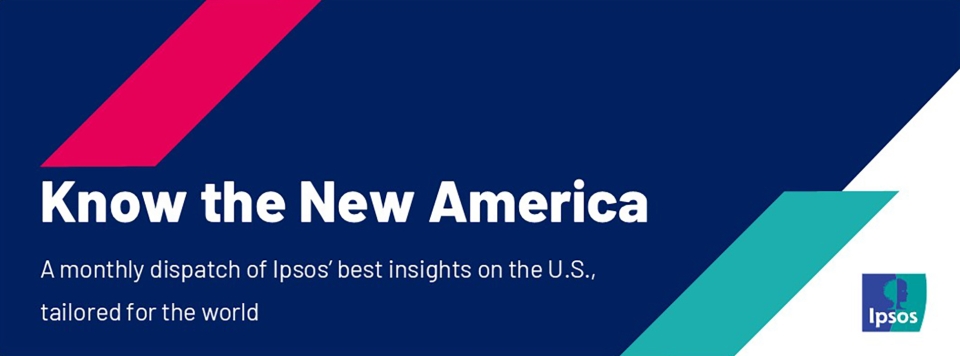Know the New America & Beyond: July 2025

“If you ride the tiger, you may be afraid to dismount” — Donald Trump's recent problems with conspiracy theories around accused sex trafficker Jeffrey Epstein highlight this. Most Americans — of whatever party — now believe something is being hidden from them, and for the first time in this presidency, his base doesn’t support him on an issue. At the same time, Trump’s ratings, low by historical standards, remain several points higher than at this stage of his first term.
Trump has survived numerous crises, but concerns in the U.S. are moving from the economy, an area of strength for Republicans, to issues like political extremism and threats to democracy, where neither party has a clear advantage.
Although Trump paused tariffs after markets reacted, they are now being implemented. While many Americans see potential long-term benefits for U.S. jobs, more are worried about the immediate negative impacts. Globally, four out of ten people say they try to avoid buying American products, including six out of ten Canadians.
Consumer confidence declines steeply among young Americans

In most countries around the world, concern about inflation remains the No. 1 personal concern, despite falling interest rates, because the post-COVID inflation surge is still a recent memory. In the U.S., consumer confidence, which had surged among younger Americans after Trump's election, is now in steady decline. So far, many producers have stockpiled or taken the pain of tariffs themselves — but will not be able to do so forever. New data from the Ipsos Consumer Tracker shows that consumers are noticing ongoing changes: The number of Americans who say they’re seeing discounts in stores has dropped 10 percentage points in the past year, to 38% today.
To understand all that’s happening in America, you must understand the American Dream — a concept that’s traveled around the world to inspire generations of immigrants. But what is the future of the Dream in the new America? Our latest research shows that the American Dream remains a set of largely shared ideas around freedom, success, opportunity and fairness, across demographics and bridging party divides. Yet looking to the future, 61% of younger Americans now feel the Dream is unattainable — reflecting the widespread “loss of the future” many European, Japanese and Latin American societies are also grappling with, with all the political upheavals that result from it.
Most first- or second-generation Americans (79%) say they or their families migrated to the U.S. because of the American Dream, and now immigration is a key focus for Trump’s administration. But new Ipsos polling shows that his approval on the issue has fallen amid controversial immigration raids around the U.S.; 41% of Americans today approve of how he is managing immigration, compared to 48% in January, according to a Reuters/Ipsos poll.
America’s new reality is still emerging and contested — we are in a period where it is clear the old consensus is broken, and leaders everywhere are searching for a new one. Read on for more and don't hesitate to contact us if you want to dig a little deeper before next month’s roundup.
Yours sincerely,
Ben Page
CEO of Ipsos
The American Dream reimagined: How brands can find opportunity in its evolving meaning
In today’s polarized times, the values behind the American Dream still unite most Americans and the messaging is still powerful. The new issue of What the Future: American Dream digs into areas of common ground, and the tensions that lie within, through new research; it also features interviews with experts from Suntory Global Spirits, the U.S. Chamber of Commerce, The Atlantic and beyond.
Fewer Americans are seeing in-store discounts amid a shifting retail landscape
Are there fewer discounts in U.S. stores? A sizeable portion of Americans think so, according to the Ipsos Consumer Tracker, and they could be correct. That could be the result of tariffs, which are on retailers’ minds as well as consumers’.
How the way Americans pay for purchases is changing
Over the last two years, more high earners in the U.S. have been paying in installments, according to the Ipsos Consumer Tracker: Half (56%) of Americans with a household income over $100k now say they’ve paid for a purchase in installments, a 16-point increase since 2023. But fewer people are using buy now, pay later apps.
Trump's overall approval has stabilized
Q: Overall, do you approve or disapprove of the way Donald Trump is handling his job as president?
What the rest of the world thinks
Canada, which was once one of the closest trading partners with the U.S., continues to adjust amid a tumultuous relationship with President Donald Trump. But Canadians are rallying behind their leadership: The number of people who say they’re confident in Canadian political leaders' ability to manage Trump has risen to 59% (a rise of 12 points).
Finally, our annual Global Ipsos Populism Report 2025 highlights a pervasive sense of dissatisfaction with societal structures and a longing for strong leadership across the world. Among the headlines: The Ipsos “System is Broken Index” finds many countries scoring higher than the United States.
And looking ahead, what does Trump’s America First policy mean for Asia? Please join us at a special webinar on Aug. 6, where we’ll be bringing together the evidence so far.
And finally, other Ipsos global reports this month
Ipsos LGBT+ Pride Report 2025 — We outline a complex tapestry of support and opposition toward LGBT+ rights.
World Refugee Day 2025 — Support for the right to seek refuge holds steady, but widespread concern about refugees’ motives and ability to integrate persist
Navigating Through Turbulence — We leverage Ipsos’ extensive research and expertise to provide a practical framework for surviving this polycrisis.
The Ipsos AI Monitor 2025 — The fourth edition sheds light on global attitudes towards AI, emphasising its potential impact on public trust and daily life — including American concerns
Personas in the Age of AI — We explore how AI is changing the way personas are created and used, and the benefits and limitations of AI-powered PersonaBots.
Short-Form Social Misfits — Achieving a balance between creative experiences and empathy is essential for the effectiveness of short-form videos.
Read the previous June 2025 edition of Know the New America & Beyond






